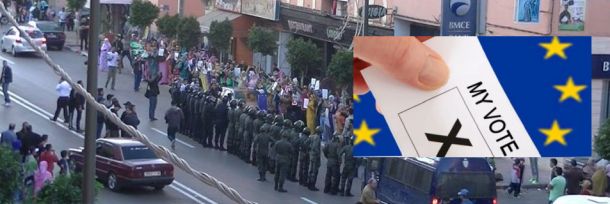Despite of the clear conclusions in the report presented by the Legal Service office of the European Parliament which point to the necessity to revise or cancel the fisheries agreement between the EU and Morocco if it continues to ignore the wishes and interests of the Saharawi people, the EU ambassador to Morocco, Eneko Landáburu, declared on 27 of May in Rabat that “The EU defends the legality of the fisheries agreement with Morocco”.
In response to the declarations made by the EU ambassador to Morocco, Western Sahara Resource Watch sent a letter of protest to the EU Commissioner on Maritime Affairs and Fisheries, Maria Damanaki. In this letter the Commissioner was asked whether she agreed with the statements by Mr. Landáburu. The letter can be downloaded here.
The complete article from the Spanish newspaper ABC can be read below (unofficial translation by Western Sahara Resource Watch). See original article here (in Spanish):
The EU defends the legality of the fisheries agreement with Morocco
Casablanca (Morocco), 27 May (EFE). The ambassador of the European Union (EU) to Rabat, Eneko Landáburu, defended today the legality of the fisheries agreement with Morocco even though he admits that a report criticizing the Moroccan authorities and the agreement’s impact on the Saharawi people will be an “important” element in its renewal.
In a press conference held today in Casablanca, Mr. Landáburu declared that “the legal services of the European Commission and all advices from independent institutions have shown that there is no problem with the international legality of the fisheries agreement with Morocco”.
He said that the legality of the fisheries agreement “could be used for political reasons, because that is the normal political game, but there is no problem”.
The EU ambassador states that the Moroccan authorities have been requested, in accordance to the agreement, to produce a study on the socioeconomic impact of the agreement on the population of Western Sahara, yet to this date there has been no answer.
“It is clear that it (the report) will be an important element in the negotiations of the next agreement commencing (February) 2011”, he said.
Mr. Landáburu made these statements after today’s meeting in Casablanca with the rest of the EU ambassadors headed by Spain and with business leaders from the Moroccan employers\' association CGEM.
The president of the commission of foreign trade of CGEM, Mr. Yunes Zrikem, assured that, representing Moroccan companies, “it is clear that the economic activity of the businesses operating in the provinces of Western Sahara benefits the local population and contributes to the development in these provinces and the country”.
“It’s a discussion which doesn’t match with the social and economic reality of that territory”, he added.
The agreement between the EU and Morocco is considered to be of high political importance regarding fisheries and offers licences to 119 vessels of the European Union, out of which 100 are Spanish.
In return, the EU pays Morocco an annual 36.1 million euro, part of that amount is earmarked for the national fisheries sector and the remainder is marked for development purposes.
With respect to another of the ongoing negotiations between Rabat and Brussels, the readmission by Morocco of expelled sub-Saharan immigrants from EU, Mr. Landáburu admits that they are facing a “demanding and complicated” agreement, but he also stressed that agreements have been achieved previously with other countries with regard to this issue.
“The Moroccans ask for financial help in order to put into action the readmission, but there are still no conclusions”, stressed Mr. Landáburu who two weeks ago linked this agreement with facilitating European visas to Moroccan citizens.
Mr. Landáburu also explained that the conversations about the liberalization of services between Morocco and the EU “are moving ahead again” after Rabat presented an offer which is currently being analyzed by Brussels and “there could be a reply by July”.
The European ambassadors held for the first time a monthly meeting in Casablanca, where they met Moroccan business leaders, the governor of the region and other regional and local leaders in a gathering which the Spanish ambassador, Luís Planas, described as a “success”.
Here is the EU Council's legal advice on fishing in occupied waters
Hans Corell criticizes EU fisheries in Western Sahara
The former Legal Counsel to the UN Security Counsel, Mr. Hans Corell, comments on the EU's fisheries activities in Western Sahara.
EU elections: how have candidates voted on occupied Western Sahara?
Are you casting your vote for the EU elections? Find here a complete overview of MEP candidates who have supported the Moroccan occupation of Western Sahara in previous controversial votes. Choose wisely.
UK High Court confirms EU Court rulings on Western Sahara
The UK Court has concluded that the UK government has acted unlawfully in granting preferential tariff treatment to products from Western Sahara through a deal with Morocco, and in granting fisheries quota's for fishing in Western Sahara under a fish deal with Morocco.

